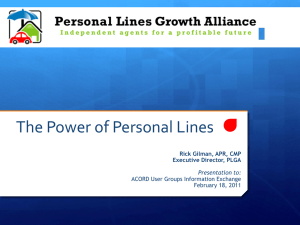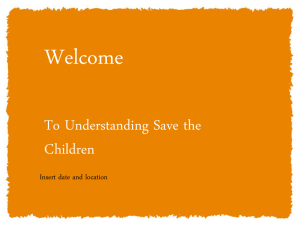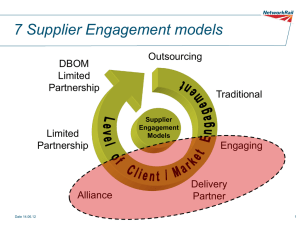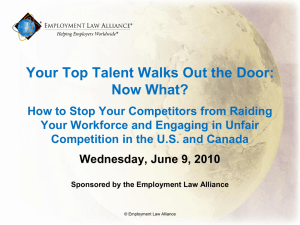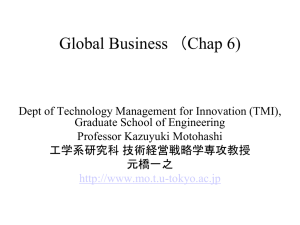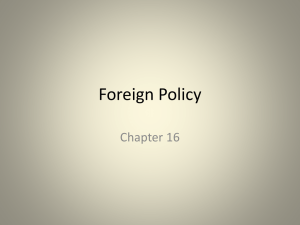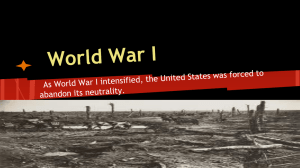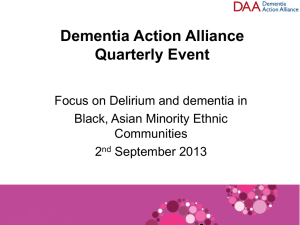Collusive Alliances and International Competition
advertisement
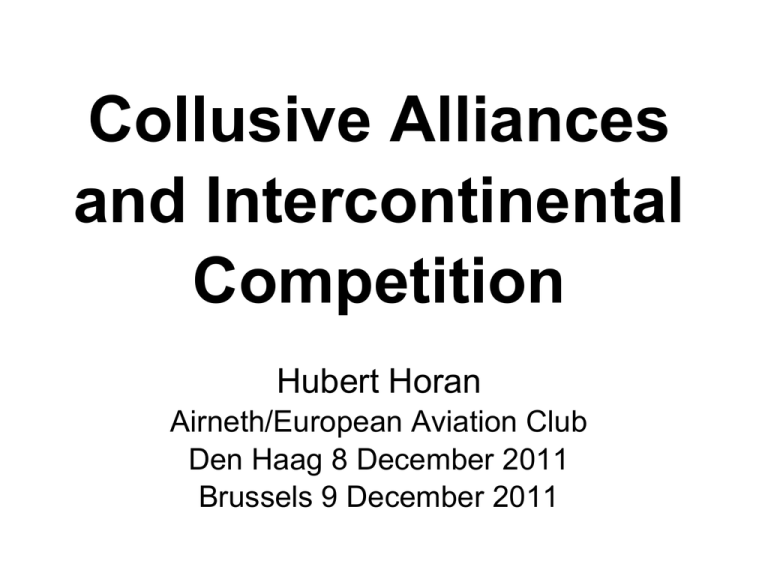
Collusive Alliances and Intercontinental Competition Hubert Horan Airneth/European Aviation Club Den Haag 8 December 2011 Brussels 9 December 2011 My perspective on consolidation Consolidation via Alliance Antitrust Immunity Developed original NW/KL alliance network Also managed from European (SR/SN) side Shut down multiple unprofitable alliances Consolidation via Merger Direct experience with economic plans, results Direct experience with true Cross-Border mergers Active involvement with current consolidation Congressional and DOT testimony recent Transportation Law Journal article Horan Airline Transactions Forum 1 March 2011 Page 2 Counter-revolution against liberal international airline competition Intercontinental consolidation since 2003—biggest structural shift in industry history--was wholly anti-competitive Totally dissimilar to pro-consumer ATI of mid 90s Unlike shorthaul/regional markets, Intercontinental sector always competitively deficient Billions in anti-competitive pricing power created Synergy claims false; Regulatory justification fraudulent End of liberal, market-based competition means industry efficiency will likely decline Legal protections gone; Cartelization spreading globally Growing threat of cross-border regulatory arbitrage Horan Airline Transactions Forum 1 March 2011 Page 3 Issue is role of alliances in consolidation, (not alliances per se) Alliances And Global Collusive Alliances Not “Branded” Alliances (with antitrust immunity— same competitive impact as merger) (no one objects to Star Alliance frequent flyer reciprocity, lounge sharing) Intercontinental (longhaul)markets— Not regional/ shorthaul markets—45% of global 55% of global revenue— exclusive focus of consolidation movement revenue— no calls for consolidation Alliances driving high concentration Competition and Cartelization Not original 1990s alliance interline codesharing links industry structure impact Horan Airline Transactions Forum 1 March 2011 Page 4 “Industry Consolidation” Movement: we need fewer Intercontinental airlines To t al Pax Airlin es, exclu d in g very sm all p ro p eller o p erat o rs 900 800 700 600 500 total industry growth All growth from shorthaul airlines 400 300 200 Intercontinental—no growth in 30 years 100 0 Regional/shorthaul sector (45% of global revenue) All industry growth— intensely competitive but no calls for consolidation Intercontinental sector (55% of global revenue) always competitively deficient due to huge entry barriers (both political, economic) Lets merge everyone into just three global competitors! 80 82 84 86 88 90 92 94 96 98 00 02 04 06 08 10 Horan Airline Transactions Forum 1 March 2011 Page 5 IC consolidation strictly North Atlantic; First (mid 90s) phase was pro-consumer Original mid-90s ATI did create Consumer Benefits Thousands of markets got online service, discount fares for the first time DTW ATL AMS ZRH original alliance benefits KL-NW (92) and SR-DL (95): fully exhausted by 1999 Alliance connections totally displaced traditional interline connections Consumer benefits only on North Atlantic markets; not pursued elsewhere Original Collusive Alliances—still robust competition 1991 1993 1995 1997 1999 2001 Concent rat ion-t ot al Nort h At lant ic market (55 million annual pax) 35% 42% 42% 45% 47% 47% t op 3 share number of US-EU compet it ors w it h minimum depart ure share of 2% 15 15 13 13 11 11 Horan Airline Transactions Forum 1 March 2011 Page 6 Post 2003 phase: no consumer benefits; permanent Cartel created Two separate “consolidation” processes Total North Atlantic 1991 Concentration-top 3 51% # Competitors (>2%) 15 2001 mostly market forces 47% 11 2012 Totally Artificial Consolidation All market exits since 93 totally artificial—big carriers petitioned government to reduce competition 26 competitors merged into a permanent Cartel Delta Northwest United Continental USAirways American TWA Finnair Austrian assumes last 3 airlines (US,VS,EI) unable to survive as small indepedents and join Cartel groups after approval of BA/AA Air France KLM Lufthansa British Air Iberia Brussels Air Canada Aer Lingus Virgin SAS Alitalia Swiss LOT TAP CSA Turkish BMI the North Atlantic Cartel 98% 3 LH-led Collusive Alliance AF-led Collusive Alliance BA-led Collusive Alliance Horan Airline Transactions Forum 1 March 2011 Page 7 Post-2003 Cartelization: biggest shift in industry history, with more to come Pacific: Unlike original 90s “Open Skies” designed to Sham US-Japan massively reduce competition, facilitate subsidies, “Open Skies” slot rules and other distortions Delta Northwest United Continental USAirways American TWA Finnair Austrian SAS Alitalia Swiss LOT Air France KLM Lufthansa British Air Iberia Brussels Air Canada Aer Lingus Virgin TAP CSA Turkish BMI worldwide: artificial market power is key LH-led Collusive Alliance 26 transAtlantic carriers AF-led Collusive Alliance BA-led Collusive Alliance 26 transPacific carriers Delta Northwest United Continental American Hawaiian Cathay Pac Air China China East China South Hainan Air Canada Philippines Singapore Thai Malaysian JAL ANA Korean Asiana China EVA Qantas Air NZ V Australia Air Pacific Cartel using its control of longhaul access to the huge EU/US markets Horan Airline Transactions Forum 1 March 2011 Page 8 Intercon: conditions to let the market decide “how many airlines” don’t exist LIBERAL COMPETITIVE CONDITIONS CAREFULLY ENGINEERED IN MOST DOMESTIC/SHORTHAUL MARKETS BUT TRULY LIBERAL CONDITIONS NEVER ESTABLISHED IN INTERCONTINENTAL MARKETS Pricing/market entry freedom Pricing/market entry freedom Access to capital markets Access to capital markets No artificial competitive barriers No artificial competitive barriers Transparent financial reporting Transparent financial reporting Open corporate control market Open corporate control market Strong antitrust rules, enforcement Strong antitrust rules, enforcement Efficient bankruptcy process ? Efficient bankruptcy process No political barriers to exit— no carriers “Too Big To Fail” No political barriers to exit— no carriers “Too Big To Fail” Objective: Maximum consumer/efficiency gains economy-wide (not interests of specific companies/employees) Objective: Maximum consumer/efficiency gains economy-wide (not interests of specific companies/employees) Consumers, investors decide “how many airlines” Governments, entrenched incumbents decide “how many airlines” Horan Airline Transactions Forum 1 March 2011 Page 9 Claims of big “scope/scale synergies” from consolidation are false Hub City Synergy ”Scope+Scale Synergy” Mergers but all 20 years ago All failed—few synergies, huge costs 82—CO/TI 86—TW/OZ 86—NW/RC 87—BA/BR 89—AF/UT/IT Also some successes in bankruptcy cases (HP/US, LH/LX) 79—PA/NA 85—PE/FL 86—AA/OC 87—DL/WA 87—CO/PE 87—US/PS 88—CO/EA 88—US/PI 98—SR/SN 98—KL/AZ 00—AA/TW 00—UA/US Recent mergers (KL-AF, DL-NW, UA-CO) claiming huge efficiencies not found in any previous merger --and provided no evidence to support merger claims Horan Airline Transactions Forum 1 March 2011 Page 10 Post-2003 Consolidation has created huge anti-competitive market power Form 41 Pax Revenue/Emplanement --index 1993=100 160 150 North Atlantic Passenger Fares Have Risen 3X Faster Than US Domestic Fares since Extreme Consolidation began in 2003 140 Top 3 Concentration 03->09 total Continent 67%-> 98% total No.Atlantic 54%-> 92% 130 120 110 100 90 ATLANTIC rev/pax DOMESTIC rev/pax 80 1993 1994 1995 1996 1997 1998 1999 2000 2001 2002 2003 2004 2005 2006 2007 2008 Total North Atlantic 1991 2001 2010 Concent rat ion-t op 3 # Compet it ors (>2% ) 51% 15 47% 11 98% 3 Horan Airline Transactions Forum 1 March 2011 Page 11 Biggest shift in industry history in less than 10 years----three key drivers #1-EU shift from liberal to “managed” competition purely anti-competitive 2003 KL/AF merger Brussels proactively driving consolidation Rig markets to favor “National Champions” (LH/AF), weaken LCCs; subsidies for weak (AZ, OS, OA, LX) totally different merger rules for AF, FR US Open Skies delayed 5 years—wanted more mergers KL/AF: no synergies/consumer benefits; ends EU longhaul competition, establishes Cartel; forces USA consolidation #2—staged sequence of follow-on ATI/mergers; DOT willingness to disobey law, use fraudulent evidence #3—huge “Consolidation is Inevitable” PR campaign Horan Airline Transactions Forum 1 March 2011 Page 12 All ATI Consumer Benefits findings based on willful DOT regulatory fraud “Double Marginalization”—ATI automatically reduces fares 15-25% --sole basis of $90 million annual Oneworld consumer benefits claim Falsely claims that physical barriers force interline carriers to always set fares $200-300 higher than online/ATI connecting fares Falsely claims that ATI always and automatically cut connecting fares $200-300 regardless of market/competitive conditions “Double Marginalization” violates laws of supply and demand False “rule” that reducing competition always reduces prices designed to nullify both the law and rules of evidence Every ATI application automatically justified; no need for case-specific evidence False claims fabricated by one UAL consultant in one paper; DOT claims “rule” justified by multiple, independent researchers based on regression of 1990s data that is totally unrelated to the pricing claim No evidence of any pricing benefits from any ATI grant since 90s No actual consumer pricing evidence submitted in any recent ATI case DOT uses fraudulent “rule” as basis for rejecting evidence of higher prices Horan Airline Transactions Forum 1 March 2011 Page 13 All recent Star/Skyteam/Oneworld ATI depended on DOT’s disregard for the law DOT disobeyed Clayton Act requirement for market power test No ATI decision had any of the pricing data, entry barrier or market contestability evidence needed to show ATI would not create market power DOT disobeyed legal requirement that ATI cannot be granted without proof of “public benefits” Private benefits to applicant (i.e. consolidation benefits Star Alliance) used by DOT as demonstration of “public benefits” DOT accepted “improved frequent flyer program” claims as proof of “public benefits” even though frequent flyer benefits decreased DOT public benefits “findings” not based on any objective data or analysis; just “copy/pasted” applicants unsubstantiated claims Newest DOT regulatory fraud—”metal neutrality” designed to extend collusion to large overlapping nonstop O&Ds Previous ATI cases had carve-outs, given pricing risks in LHR-ORD type markets DOT established new “rule” based on false claim that “metal neutral” alliances cannot function if any routes excluded Rule based on paper by same consultant who fabricated “Double Marginalization” Horan Airline Transactions Forum 1 March 2011 Page 14 “Industry Consolidation movement”-successful misinformation/PR campaign Inevitable trend towards industry consolidation Industry growing for decades “Trend” just biggest Atlantic carriers Industry consolidation driven by market forces All from government actions; Capital markets not interested Consolidation OK—lots of competition remains shorthaul competitive; Intercon always stagnant/getting and worse Consolidation justified by big scale/scope synergies No previous merger found synergies; United isn’t too small to compete ATI always drives lower consumer fares No verifiable evidence of any consumer benefits since 1999 Alliances create FF and other consumer benefits Branded alliance benefits falsely attributed to Collusive Alliances There has been no independent (regulatory, media, academic) scrutiny of these “Industry Consolidation” claims Horan Airline Transactions Forum 1 March 2011 Page 15 Counter-revolution against liberal international airline competition 90s: Global Liberalization Today: Intercon Cartelization Who determines number of competitors? Consumers, investors in the open marketplace Governments, entrenched incumbents via private “backroom” discussions Capital flows, efficiency gains From less-efficient to more- More-efficient at mercy of lessefficient efficient (but Too Big To Fail) Legal/regulatory objective consumer welfare, longterm industry efficiency, “level-playing field” Protect/enrich a handful of private companies, especially “national champions” Legal/regulatory approach Neutral umpire enforcing transparent rules using objective data/evidence Undermine law/precedent with fraudulent evidence; opaque rules applied arbitrarily Role of “Open Skies” Facilitate new entry, reduce Facilitate reduced competition cross-border and artificial and regulatory arbitrage; barriers increased protection of weak; Driver of airline success Efficiency, service quality, network strength Ability to capture regulators; control of alliance access Horan Airline Transactions Forum 1 March 2011 Page 16 Looking forward given tomorrow’s highly illiberal environment Continuing, artificial consolidation --many moves unthinkable 10 years ago reducing trans-Pacific from 26 to 3 competitors BA acquiring BMI; only 4 carriers for entire USA crude Canadian/German anti-EK protectionism Negative outlook for markets and industry --stagnant competition means declining efficiency Competition weakens further—3 alliance competition unsustainable LHR-based Oneworld uncompetitive with continental duopoly squeeze of small alliance members and domestic LCCs growth of cross-border regulatory arbitrage threatens financial/consumer/safety protections UAL IAD-MAD precedent; Qantas offshoring; Tiger safety lapses Horan Airline Transactions Forum 1 March 2011 Page 17 Horan Airline Transactions Forum 1 March 2011 Page 18 Horan Airline Transactions Forum 1 March 2011 Page 19 Current Branded/Collusive Alliance models evolved 15+ years ago Alliances categories pre-1990 Frequent Flyer partners foreign airlines join United’s Mileage Plus program or American’s Aadvantage program Narrow route-extention codesharing foreign airlines codeshare on US domestic flights, providing connecting service to points it would (could) not otherwise serve Route-revenue pooling with codesharing Pan Am/Saudia pool revenues, profits from each other’s flights in a specific market No anticompetitive risks No anticompetitive risks new post-1990 Alliances “Branded” Alliances 90-Global Excellence 97-Star 98-Oneworld 00-Skyteam Collusive Alliances on the North Atlantic Obvious risks very rare in US markets since 70s; but still common outside US 92-KL-led alliance(NW) 95-SR-led alliance (DL) 97-LH-led alliance (UA) 00-AF led alliance (DL) 09-BA led alliance (AA) Horan Airline Transactions Forum 1 March 2011 Page 20 Decades of strong, continuous structural growth Horan Airline Transactions Forum 1 March 2011 Page 21 Driving structural growth> dynamic competitive “churn” Competitive “churn”-- active entry and exit— reallocation of capital from weak to strong Innovation/productivity driven by both serious threat of failure/entry and real opportunity to grow If weak carriers don’t exit, strong incumbents, entrants can’t grow Churn (exit) since 1980: 77%--USA 56%--W. Europe/rest of Western Hemisp. 40%--rest of world Horan Airline Transactions Forum 1 March 2011 Page 22 Alliance Public Benefits: 30% of North Atlantic seriously underserved in 1990 70% of market had good online schedules, full range of discount fares Nonstop Big Gateway New York to top 20 EU cities London to top 20 US cities JFK ORD ATL One-stop Big Gateway cities to Interior cities top 5-6 EU cities to hundreds of US cities (via US hubs) top 5-6 US cities to hundreds of EU cities (via EU hubs) LHR CDG FRA but 30% of market had poor service and very few discount fares USA Interior cities to EU Interior cities (i.e. St. Louis-Brussels, Milwaukee-Munich) no online or coordinated schedules; passengers forced to change airlines and terminals; only highest fares available previous solution (PA/TW hubs in Europe) had failed Horan Airline Transactions Forum 1 March 2011 Page 23 UK and Continental Europe markets---very different competitive dynamic UK/Ireland-USA market 15 million pax pure nonstop market LON not served via European hubs; 80% is London traffic DTW ORD EWR CVG SFO JFK PHL IAD AMS BRU PAR DFW LAX ATL IAH FRA ZRH MUC MAD MIA CPH MXP FCO Continental Europe—USA 40 million pax pure hub market London no longer seriously competes for US-Europe connecting traffic Continental Hubs don’t serve London/Dublin traffic Horan Airline Transactions Forum 1 March 2011 Page 24 Huge risk to consumers with Cartel, 95%+ concentration in place Rapidly Increasing Concentration Healthy, Profitable Competition, concentration even with Alliances 1995 1997 1999 2001 Permanent Cartel with huge entry barriers after 2004 2003 2005 2007 2009 Concent rat ion levels of US-Cont inent al Europe market (40 million annual pax) top 3 share 47% 55% 56% 61% 67% 85% 88% 97% Concent rat ion levels of t ot al Nort h At lant ic market (55 million annual pax) top 3 share 42% 45% 47% 47% 54% 68% 66% 97% number of t ot al Nort h At lant ic compet it ors wit h minimum depart ure share of 2% 13 Risks to Consumers 13 11 very low 11 9 7 Serious 6 3 HUGE Horan Airline Transactions Forum 1 March 2011 Page 25 North Atlantic competitors,concentration and departure shares 1991-2008 1 2 3 4 5 6 7 8 9 10 11 12 13 14 15 16 17 18 19 20 21 22 23 24 25 26 27 19 91 19 93 19 95 top2 23.8% top2 31.1% top2 29.0% top 3 34.6% top 3 42.3% top 3 42.4% top4 44.0% top4 50.2% top4 51.3% CA% 0.0% CA% 0.0% CA% 7.3% num ber of com pet it ors w it h m inim um 0.5% 24 0.5% 25 0.5% 22 2% 15 2% 15 2% 13 5% 6 5% 6 5% 7 19 91 19 93 19 95 BA 12.0% DL 16.5% DL 14.5% PA 11.8% AA 14.6% AA 14.4% TW 10.7% BA 11.2% BA 13.4% AA 9.4% UA 7.9% UA 9.0% LH 8.7% LH 6.5% KL 7.3% DL 6.4% TW 5.8% LH 5.9% AF 4.9% AF 4.1% TW 5.1% KL 4.3% KL 3.9% AF 4.3% SR 3.5% NW 3.7% VS 3.5% SK 3.4% CO 3.4% CO 3.0% NW 3.3% SR 2.7% AZ 2.8% UA 2.6% SK 2.5% SR 2.5% AZ 2.4% AZ 2.5% SK 2.0% CO 2.2% VS 2.5% SN 1.7% VS 2.2% US 2.3% EI 1.3% IB 1.8% IB 1.5% IB 1.2% SN 1.7% SN 1.0% US 1.1% US 1.2% EI 0.9% LO 0.8% EI 1.1% SU 0.8% SU 0.8% LO 0.8% LO 0.7% OS 0.8% TP 0.7% OS 0.7% OK 0.8% SU 0.7% OK 0.7% AY 0.6% AY 0.6% TP 0.7% TP 0.5% JU 0.5% AY 0.6% OA 0.4% OA 0.4% OA 0.5% MA 0.4% OS 0.4% TK 0.4% TK 0.3% OK 0.4% NG 0.2% RO 0.3% 19 97 19 99 top2 31.5% top2 34.6% top 3 45.0% top 3 47.5% top4 53.2% top4 59.1% CA% 25.6% CA% 42.0% depart ure share of : 0.5% 19 0.5% 19 2% 13 2% 11 5% 6 5% 6 19 97 19 99 SR 17.9% SR 17.3% BA 13.5% LH 17.3% AA 13.5% BA 12.9% UA 8.2% AA 11.7% KL 7.7% KL 7.4% LH 6.1% CO 6.3% AF 4.4% AF 4.6% CO 3.9% VS 4.3% VS 3.9% US 3.3% TW 3.6% TW 2.4% AZ 2.9% AZ 2.0% US 2.8% EI 1.7% SK 2.1% IB 1.4% EI 1.7% SU 1.1% IB 1.2% LO 0.9% LO 1.1% OK 0.8% SU 1.0% MP 0.8% OK 0.9% TP 0.6% TP 0.5% TK 0.5% AY 0.5% AY 0.4% TK 0.4% OA 0.3% AI 0.4% MA 0.3% OA 0.4% H2 0.3% MA 0.3% RO 0.2% UX 0.2% JK 0.2% RO 0.2% FF 0.2% FF 0.2% UX 0.1% 20 top2 top 3 top4 CA% 01 36.1% 47.3% 58.0% 43.6% 20 top2 top 3 top4 CA% 03 41.0% 54.0% 65.2% 48.6% 20 top2 top 3 top4 CA% 05 55.6% 67.9% 79.4% 55.6% 20 top2 top 3 top4 CA% 06 54.1% 66.2% 77.6% 54.1% 20 top2 top 3 top4 CA% 07 54.2% 65.8% 76.5% 54.2% 20 top2 top 3 top4 CA% 0.5% 2% 5% 20 SR LH BA AA KL CO AF VS US AZ EI IB TW LO OK SU TK MP TP OA AY JK MA UX RO H2 18 0.5% 14 0.5% 9 0.5% 9 0.5% 9 0.5% 11 2% 9 2% 7 2% 6 2% 6 2% 7 5% 6 5% 5 5% 5 5% 5 5% 01 20 03 20 05 20 06 20 07 20 18.1% LH 20.7% AF 28.7% AF 28.4% AF 28.3% AF 18.0% AF 20.3% LH 26.8% LH 25.6% LH 25.9% LH 11.2% BA 12.9% BA 12.3% BA 12.2% BA 11.6% BA 10.8% AA 11.2% AA 11.5% AA 11.4% CO 10.7% CO 7.5% KL 7.6% CO 8.4% CO 10.1% AA 10.4% AA 6.6% CO 7.2% VS 4.8% VS 4.7% VS 4.9% VS 5.6% VS 4.6% EI 2.0% EI 2.0% EI 1.8% EI 4.5% US 4.5% IB 1.5% IB 1.3% IB 1.4% IB 4.2% SR 2.8% SU 0.7% SU 0.6% SU 0.5% SU 2.6% EI 1.9% TK 0.5% MP 0.5% E0 0.5% E0 2.0% IB 1.6% MP 0.4% TK 0.4% TK 0.4% MY 1.6% LO 0.9% AY 0.3% OA 0.3% MY 0.4% GJ 1.2% SU 0.7% OA 0.3% AY 0.3% MP 0.4% OA 0.9% TK 0.5% MA 0.2% MA 0.2% GJ 0.3% AY 0.8% TP 0.4% VV 0.2% E0 0.2% OA 0.3% MA 0.7% MP 0.4% A7 0.0% MY 0.2% AY 0.2% VV 0.6% AY 0.3% VV 0.2% MA 0.2% Y2 0.6% OA 0.3% A7 0.1% VV 0.2% A0 0.5% MA 0.2% GJ 0.1% A0 0.1% Y7 0.4% RO 0.2% Y7 0.1% 0.3% VV 0.0% A7 0.1% 0.3% A7 0.0% 0.3% 0.2% KL indicates Collusive Alliance group 0.1% CA% total Collusive Alliance departure share 0.0% USDOT Form 41 T100 data for 12 months ending 2nd Q of year shown Horan Airline Transactions Forum 1 March 2011 Page 26 08 55.5% 67.2% 78.1% 55.5% 9 6 5 08 28.9% 26.6% 11.7% 10.8% 10.5% 5.0% 1.8% 1.4% 0.6% 0.5% 0.4% 0.3% 0.3% 0.2% 0.2% 0.2% 0.2% 0.1% 0.1% 1 2 3 4 5 6 7 8 9 10 11 12 13 14 15 16 17 18 19 20 21 22 23 24 25 26 27 Liberal competition drove decades of profitable industry growth Objectives of Airline Deregulation and US Open Skies treaties pressure from Liberal Airline Competition Innovation/productivity gains continuously improve industry capital allocation— better airlines prosper/grow bad airlines shrink/exit market Consumers: More service at lower fares Industry: Profits, capital for growth LIBERAL AIRLINE COMPETITION—ECONOMIC REQUIREMENTS Pricing/market entry freedom Transparent financial reporting Access to capital markets Strong antitrust rules, enforcement No artificial competitive barriers Efficient bankruptcy process Open corporate control market No political barriers to exit LIBERAL AIRLINE COMPETITION—POLITICAL REQUIREMENTS Let Consumers/Capital Markets pick winners (level-playing field) Focus on Maximum Gains Economy-Wide (not favored companies) Horan Airline Transactions Forum 1 March 2011 Page 27 Consolidation: recent, artificial, and not driven by market competitiveness In 21 of the 22 cases competition reduced artificially--petitioning governments for approval to merge or join a collusive alliance Consolidation used to protect small/weak airlines competitive exit of Large/Medium North Atlantic carriers since 1993 PA NW DL SN OS UA SK BD TW AZ OK US KL SR-LX LO TP TK CO AA VS IB AY 1993 1993 1995 1995 1995 1997 1997 2001 2002 2002 2002 2004 2004 2005 2005 2005 2008 2009 2009 2009 2009 2009 m arket f orces art if icial art if icial art if icial art if icial art if icial art if icial art if icial art if icial art if icial art if icial art if icial art if icial art if icial art if icial art if icial art if icial art if icial art if icial art if icial art if icial art if icial joined KL, t hen AF-led collusive alliance joined SR, t hen AF-led collusive alliance joined SR-led collusive alliance joined SR, t hen LH-led collusive alliance joined LH-led collusive alliance joined LH-led collusive alliance joined LH-led collusive alliance acquired by AA joined AF-led collusive alliance joined AF-led collusive alliance joined LH-led collusive alliance acquired by AF joined LH-led collusive alliance joined LH-led collusive alliance joined LH-led collusive alliance joined LH-led collusive alliance pet it ioned t o join LH-led collusive alliance pet it ioned t o join BA-led collusive alliance considering joining LH-led collusive alliance pet it ioned t o join BA-led collusive alliance pet it ioned t o join BA-led collusive alliance Horan Airline Transactions Forum 1 March 2011 Page 28 Consolidation: recent, artificial, and not driven by market competitiveness 21 of the 22 large/medium carriers that stopped competing independently did so artificially--by petitioning governments for approval to merge or join a collusive alliance since 93 only very small carriers were forced to exit by market competition competitive exit-Large/Medium carriers PA NW DL SN OS UA SK BD TW AZ OK US KL SR-LX LO TP TK CO AA VS IB AY 1993 1993 1995 1995 1995 1997 1997 2001 2002 2002 2002 2004 2004 2005 2005 2005 2008 2009 2009 2009 2009 2009 market f orces art if icial art if icial art if icial art if icial art if icial art if icial art if icial art if icial art if icial art if icial art if icial art if icial art if icial art if icial art if icial art if icial art if icial art if icial art if icial art if icial art if icial joined KL, t hen AF-led collusive alliance joined SR, t hen AF-led collusive alliance joined SR-led collusive alliance joined SR, t hen LH-led collusive alliance joined LH-led collusive alliance joined LH-led collusive alliance joined LH-led collusive alliance acquired by AA joined AF-led collusive alliance joined AF-led collusive alliance joined LH-led collusive alliance acquired by AF joined LH-led collusive alliance joined LH-led collusive alliance joined LH-led collusive alliance joined LH-led collusive alliance pet it ioned t o join LH-led collusive alliance pet it ioned t o join BA-led collusive alliance considering joining LH-led collusive alliance pet it ioned t o join BA-led collusive alliance pet it ioned t o join BA-led collusive alliance exit of very small competitors JU UT NG 6U UN TZ H2 JK UX FF RO A7 MA MP E0 MY A0 Y7 1992 1994 1995 2000 2000 2000 2001 2002 2002 2002 2004 2007 2008 2008 2008 2008 2008 2008 market f orces art if icial-acquired by AF art if icial--joined SR/LH-led alliances market f orces market f orces market f orces market f orces market f orces market f orces market f orces market f orces market f orces market f orces art if icial-acquired by AF market f orces market f orces art if icial-acquired by BA market f orces Horan Airline Transactions Forum 1 March 2011 Page 29 Almost every merger since deregulation has been a dismal financial failure 80: Pan Am/National 1-Post Dereg FAILURE—largely liquidated 82: Texas Intl/Continental 1-Post Dereg FAILURE—quickly bankrupt 85: Southwest/Muse 2-Quasi-BK Profitable—cheap acquisition 85: People Exp/Frontier 4-Synergy/Scope FAILURE—soon bankrupt 86: TWA/Ozark 1-Post Dereg Profitable—Restructured STL 86: Northwest/Republic 1-Post Dereg Profitable—Restructured DTW/MSP 86: American/Aircal 4-Synergy/Scope FAILURE—totally liquidated 87: Continental/PE/NY/FL 4-Synergy/Scope FAILURE—soon bankrupt 87: Delta/Western 4-Synergy/Scope FAILURE—largely liquidated 87: Continental/Eastern 4-Synergy/Scope FAILURE—soon bankrupt 88: USAir/PSA 4-Synergy/Scope FAILURE—largely liquidated 88: USAir/Piedmont 4-Synergy/Scope FAILURE—soon bankrupt 94: Southwest/Morris 3-Small Acquis Profitable—easy fit with SWA 99: American/Reno 4-Synergy/Scope FAILURE—largely liquidated 00: American/TWA 4-Synergy/Scope FAILURE—largely liquidated 00: United/USAir (plan) 4-Synergy/Scope FAILURE—quickly bankrupt 05: America West/USAir 2-Quasi-BK Jury Out—low asset cost 5 categories of mergers: 1—Post Deregulation Hub Restructuring 2—Bankruptcy-type Asset restructuring 3—Small Acquisition easily integrated 4—Cost Synergies/ Network Scope 5—Anti-Competitive; exploit dominance, entry barriers Horan Airline Transactions Forum 1 March 2011 Page 30 Anti-competitive impacts confirmed by preliminary 2010 pricing data 160 Form 41 Pax Revenue/Emplanement--index 1999=100 150 140 Artificial Market Power on North Atlantic drove rapid 2010 price recovery not seen in Domestic or Other International markets DOMESTIC rev/pax 130 ATLANTIC rev/pax INTexclATL rev/pax 120 110 100 90 80 1999 2000 2001 2002 2003 2004 2005 2006 2007 2008 2009 2010 post 2004 market power defied laws of supply and demand Domestic fares +15% because seats only + 1% Atlantic fares +46% despite seats +45% Horan Airline Transactions Forum 1 March 2011 Page 31 Post-2003 consolidation required gutting all key antitrust tests Two Tests—Central to all Competition Law Does consolidation increase risks of sustainable anticompetitive market power? Are markets contestable? Entry barriers large? Does consolidation create significant, market-wide consumer benefits (lower prices/increased output)? Clearly large enough to offset competitive risks? Need objective, verifiable evidence to meet tests Evidence must be significant, market-wide Evidence must be market/case specific and linked to competitive advantage in these markets Evidence of comparable benefits in similar cases Horan Airline Transactions Forum 1 March 2011 Page 32 Horan Airline Transactions Forum 1 March 2011 Page 33
